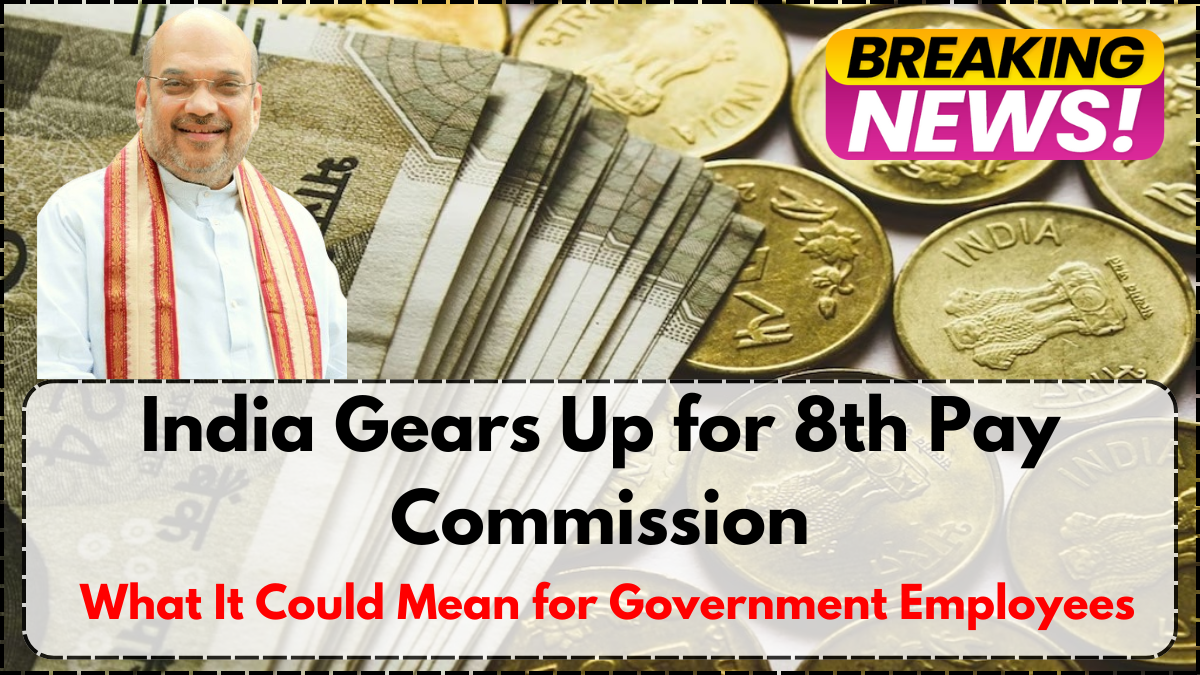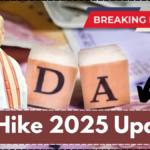The Indian government is preparing for the rollout of the 8th Pay Commission, expected to significantly impact the earnings and welfare of nearly 1.15 crore central government employees and pensioners. Announced in January 2025, this commission aims to evaluate and revise the salary and pension structures in alignment with current economic indicators, inflation rates, and the evolving cost of living.

Effective Date and Scope of Impact
The 7th Pay Commission will officially conclude on December 31, 2025, paving the way for the 8th Pay Commission’s implementation from January 1, 2026. The new recommendations will apply to approximately:
| Category | Estimated Number of Beneficiaries |
|---|---|
| Central Government Employees | 50 lakh |
| Government Pensioners | 65 lakh |
| Total Beneficiaries | 1.15 crore |
This initiative is being closely watched by a large section of public servants, both working and retired, who are hoping for meaningful changes not just in pay scales but also in broader welfare measures.
Government Assurance on Pension Parity
One of the most discussed concerns is whether employees retiring before the effective date—January 1, 2026—will receive equal benefits. Addressing this, Finance Minister Nirmala Sitharaman clarified in a recent press briefing that pensioners will not be left behind, regardless of their retirement date.
“There will be no disparity in pension disbursement under the 8th Pay Commission. The Finance Bill amendments only reaffirm current provisions and do not reduce any benefits,” she stated.
This statement has brought much-needed relief to those set to retire between now and December 2025, who feared losing out on revised pensions.
Healthcare Reform: CGHS Under Scrutiny
Beyond financial revisions, a key area the 8th Pay Commission is expected to tackle is healthcare accessibility. The Central Government Health Scheme (CGHS), though operational for decades, has faced mounting criticism for outdated infrastructure, poor outreach in rural areas, and long waiting times.
Currently, CGHS caters to:
-
OPD consultations
-
Inpatient treatments at empanelled hospitals
-
Limited reimbursement for emergency care
However, the uneven distribution of facilities and lack of modern services, especially outside metro cities, has led to serious dissatisfaction.
Introduction of CGEPHIS: A New Health Insurance Scheme
In response, the Ministry of Health is actively considering a new insurance-based model named the Central Government Employees and Pensioners Health Insurance Scheme (CGEPHIS). If launched, this initiative could:
-
Be managed by IRDAI-licensed insurance firms
-
Offer cashless hospitalization across private and public hospitals
-
Include better diagnostics, preventive care, and specialist consultations
-
Provide family floater options for dependents
The aim is to offer more uniform, efficient, and wider-reaching healthcare coverage, especially for those residing in semi-urban and rural zones where CGHS facilities are limited or non-existent.
Historical Context and Anticipated Improvements
The 6th and 7th Pay Commissions previously flagged the inefficiencies of CGHS and advocated for a reimagined approach. However, implementation delays and budgetary limitations kept these suggestions from materializing. The 8th Pay Commission may finally bring these long-overdue changes to life.
What to Expect in the Coming Months
With the formation of the 8th Pay Commission now confirmed, the focus will shift to:
-
Constituting expert panels to study current pay and service conditions
-
Engaging with employee unions and pensioner associations
-
Submitting interim and final reports before December 2025
-
Finalizing salary structures that reflect inflation and economic realities
The government is also expected to review grade pay rationalization, performance-linked pay, and non-monetary incentives, all of which play a role in boosting public sector efficiency and morale.
Conclusion
The 8th Pay Commission marks a pivotal moment for India’s public sector workforce. Not only does it promise financial elevation, but it also signals a broader shift toward more employee-friendly policies, especially in terms of healthcare reform. With implementation expected in early 2026, government employees and pensioners have reason to anticipate a more equitable and sustainable future.
FAQs About the 8th Pay Commission
What is the 8th Pay Commission?
The 8th Pay Commission is a government-appointed body tasked with recommending revised pay, pension, and benefits for central government employees and pensioners, effective January 1, 2026.
Who will benefit from the 8th Pay Commission?
Approximately 50 lakh active employees and 65 lakh pensioners will be impacted. It includes those serving in various ministries, departments, and public sector units under the central government.
Will pensioners retiring before January 1, 2026 be eligible?
Yes, Finance Minister Nirmala Sitharaman confirmed that all pensioners, regardless of retirement date, will receive benefits under the new pay structure.
Is the CGHS being replaced?
The Central Government Health Scheme may be replaced or supplemented by a new insurance-based model called CGEPHIS, aimed at improving healthcare accessibility and quality.
What is CGEPHIS?
The Central Government Employees and Pensioners Health Insurance Scheme (CGEPHIS) is a proposed health insurance model that could offer cashless services via IRDAI-approved insurers across the country.
When will the 8th Pay Commission be implemented?
The new pay structure is set to come into effect from January 1, 2026, following the end of the 7th Pay Commission on December 31, 2025.
Will salaries increase significantly?
The exact hike will be determined by the commission’s recommendations, but a 15-20% revision is widely anticipated, based on inflation and fiscal space.
Will there be changes in grade pay?
There is a possibility of revising grade pay structures to remove anomalies and better reflect responsibilities, though final decisions will depend on the commission’s findings.
How can employees track updates?
Employees and pensioners can stay informed through official government portals, departmental updates, and union advisories.
Will the changes be permanent?
The 8th Pay Commission’s recommendations, once accepted by the Union Cabinet, typically remain in force until the next commission is set up—usually every 10 years.
For More Information Click Here
Pari is a passionate writer known for captivating stories that blend imagination and reality. Inspired by travel, history, and everyday moments, Pari crafts narratives that resonate deeply with readers.




